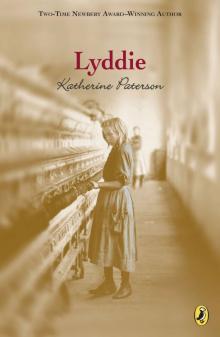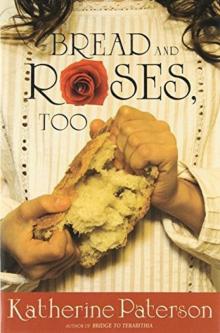- Home
- Katherine Paterson
The Great Gilly Hopkins Page 7
The Great Gilly Hopkins Read online
Page 7
Mr. Randolph was shifting in his chair across the room. She looked into his blank white eyes. Oh, god. Maybe he could really see. Maybe it was all a trick to fool people. She froze.
“You certainly are doing a beautiful job. So careful. My, my, I don’t know when this room has been so thoroughly cleaned before.”
“I—I—I’m sort of straightening up the book shelves.”
“Fine, fine.” He was bobbing his head. “Now if there were just some way you could straighten up this old brain of mine as well….”
She was not going to panic. He couldn’t see. Of course, he couldn’t see. It was really better that he was in the room. Nobody would suspect her of stealing right from under his nose. She dusted the space and then moved “Sarsaparilla” down to the shelf that held the rest of the encyclopedia set. On the shelf from which it had come, she proceeded to remove, one by one, all the other books, wiping carefully behind each one to the dark-stained wood at the back of the case. With every book her hope rose and fell, rising a little less and falling a little more each time. At last she knew that her lie to Agnes had proved all too true. There was no more money.
Fear and anticipation curdled in her stomach. She wanted to throw up.
Mr. Randolph was chatting away happily. She couldn’t seem to tune in the words, just the maddeningly cheerful tone of his high-pitched voice. She wanted to throw a book at the noise—kick over the stepladder—crash a chair through the window—at the very least scream out her frustration.
But, of course, she didn’t. Wrapped in a silent, frozen rage, she folded the stepladder and carried it to the basement.
“You going now, Miss Gilly?” The voice followed her down and up the steps and out of the house. “Thank you, thank you. Come back for another little visit, won’t you? Be sure to tell Mrs. Trotter what a lovely help you’ve been.”
She made no attempt to answer him. It didn’t matter what he thought. He was of no use to her. Thirty-nine stinking dollars.
She went straight to her room, took the brown suitcase from under the bed, and unpacked it. Then she ripped out a sheet of paper through the rings of her notebook, lay down on the bed, and pressing on her math book, wrote:
1408 Aspen Ave.
Thompson Park, Md.
Dear Courtney Rutherford Hopkins
I received your card. I am sorry to bother you with my problems, but as my real mother, I feel you have a right to know about your daughter’s situation.
At the present time, it is very desperate, or I would not bother you. The foster mother is a religious fanatic. Besides that she can hardly read and write and has a very dirty house and weird friends.
She started to write “colored” but erased it, not sure how Courtney might react.
There is another kid here who is probably mentally retarded.
I am expected to do most of the work including taking care of him (the mentally retarded boy) which is very hard with all my schoolwork, too.
I have saved up $39 toward my ticket to California. Please send me the rest at your earliest convenience.
She wrote “Love” then changed it to
Yours sincerely,
your daughter,
Galadriel Hopkins
P.S. I am very smart and can take care of myself, so I will not be a burden to you in any way.
P.S. Again. I have checked the cost of a bus ticket to San Francisco. It is exactly $136.60 one way. I will get a job and pay you back as soon as possible.
She listened at the top of the stairs until she heard Trotter go into the downstairs bathroom. Then she crept into the kitchen, stole an envelope and a stamp from the kitchen drawer, and ran to the corner to mail her letter before the rage could defrost and change her mind.
THE ONE-WAY TICKET
Not everything in the letter to Courtney had been absolutely true, but surely the part about Trotter being a religious fanatic was. She read the Bible and prayed every day, always joining Mr. Randolph’s grace over the food. Besides, anybody who started for church at nine in the morning on Sunday and didn’t get home until after twelve thirty had to be peculiar.
Sunday mornings were torture to Gilly. The church was a strange little white frame building stuck up on a hill behind the police station, built when the city was a country town instead of part of the metropolitan Washington sprawl. The church didn’t fit in the modern world anymore than the people who went there did.
The children’s Sunday-school class, in which both Gilly and W.E. were lumped with the five other six-to twelve-year-olds in the church, was presided over by an ancient Miss Minnie Applegate, who reminded her seven charges every Sunday that she had been “saved” by Billy Sunday. Who in the hell was Billy Sunday? He sounded like a character from the comics. Billy Sunday meet Brenda Starr. Also, Miss Applegate neglected to say what Billy Sunday had saved her from. A burning building? The path of a speeding locomotive? Or indeed, having been so luckily preserved, what good had her pickling accomplished for either herself or the world?
Old Applegate would do things like lecture them on the Ten Commandments and then steadfastly refuse to explain what adultery was.
“But, Miss Applegate,” an eight-year-old had sensibly asked, “if we don’t know what adultery is, how can we know if we’re doing it or not?”
Gilly, of course, knew all about adultery. In whispered conversations between Sunday school and church, she offered for sale not only the definition of the word but some juicy neighborhood examples (which had lately come to her attention, thanks to Agnes Stokes). In this way she gained seventy-eight cents in coins previously designated for the church collection plate.
The preacher was as young as the Sunday-school teacher was old. He, too, was high on getting saved and other matters of eternal preservation. But his grammar was worse than Trotter’s, and, to Gilly’s disgust, he’d stumble over words of more than one syllable whenever he read the Bible. Nobody but a religious fanatic would put up with such gross ignorance for over an hour every week of their lives—nobody but religious fanatics and the innocent victims they forced to go to church.
Unlike some of the women, Trotter didn’t carry on over the preacher at the church door, which made Gilly bold enough to ask her once, “How can you stand him?” It was the wrong question. Trotter sucked in her breath and glowered down at her like Moses at the Israelites’ golden calf. “Who am I,” she thundered, “to pass judgment on the Lord’s anointed?” Would anybody but a fanatic say a thing like that?
Mr. Randolph went to the black Baptist church. The same taxi that took Trotter and the children to the white Baptist church dropped him off on the way and picked him up on the way home. Gilly noted that the black Baptists dressed fancier and smiled more than the whites. But their services lasted even longer, and often W.E. would have to run in and get the old man out of his service while the taxi meter impatiently ticked away. It was usually past two by the time they got out of their Sunday clothes, cooked dinner, and finally sat down to their long, lazy meal.
The Sunday after the futile dusting, Mr. Randolph surprised everyone by refusing seconds.
“Oh, you must know, Mrs. Trotter, how it pains me to say No to this exquisite chicken, but my son is coming over about three.”
At the word “son,” something clanked inside Gilly’s chest. Suppose the son noticed that something was funny in Mr. Randolph’s living room? The chair on the opposite side, the books rearranged? Suppose he knew where the money should have been?
“Oh, you got time for a piece of pie, now, don’t you, Mr. Randolph? It’s cherry today.”
“Cherry. My, my.” Mr. Randolph held his bony thumb and index finger an inch apart. “About so much, all right? I’m helpless before your cherry pies, Mrs. Trotter. Totally helpless.”
He was chewing the pie blissfully when suddenly he stopped. “Oh, my. Have I got any spots on my clothes? My son gets so upset.”
Trotter put her fork down and studied him. “You look good, Mr. Randolph. Only just a li
ttle something on your tie.”
“Oh, mercy, mercy. The boy is always looking for some excuse to say I can’t take care of myself so he can drag me over to his big house in Virginia.” He dipped his napkin into his water glass and tried to dab his tie, completely missing the offending spots.
“Oh, shoot, Mr. Randolph. Let me get you one of Melvin’s old ties to wear. I don’t know why I still got so much of his stuff around anyhow.” She sniffed as if to clear away a memory of the late Mr. Trotter. “Gilly, run up to my room and look in the back of the closet, will you? There’s a dozen or more on a coat hanger.” Before Gilly got out the door, she added, “Just pick a nice one, hear? Not one of the real loud ones.” She turned, half apologetically to Mr. Randolph. “Sometimes in those last years, if Melvin was feeling low, he’d go out and buy some wild tie and wear it every day for a week.” She shook her head. “I guess I should praise the Lord it wasn’t some wild woman he was hanging round his neck.”
Mr. Randolph giggled. “Why don’t you bring me a wild one, Miss Gilly? I need to wake up that fifty-year-old senior citizen I’ve got for a son.”
Trotter threw back her massive head and belly-laughed. “You’re some kinda man, Mr. Randolph.”
“Well, you’re some kind of lady.”
Gilly fled up the stairs. These scenes between Trotter and Mr. Randolph made her insides curl. It was weird to see old people carry on, old people who weren’t even the same color.
But it was not that silly little flirtation that was bothering her. It was a vision of Mr. Randolph’s prissy fifty-year-old son poking around his father’s living room. So when she saw Trotter’s purse with its no-good fastener lying wide open on the bed, inviting her, practically demanding her to look in, she did so. Good god. Trotter must have just cashed her check from county welfare. Gilly did a quick count—at least a hundred. Another hundred would get her all the way to California—all the way to Courtney Rutherford Hopkins, all the way home.
She stuffed the money in her pocket, went to the closet, and found the hanger full of Melvin’s madness. She chose the gaudiest one there—four-inch-high ballet dancers in purple tutus, their pink legs pirouetting on a greenish four-in-hand. She tiptoed to her own room, slipped the fat wad of bills in her drawer under her T-shirts, and tiptoed back to Trotter’s door; once there, she slammed her feet down and noisily descended the stairs.
“Oh, my sweet baby, what have you done?”
Gilly’s blood went cold. How could Trotter know?
“That tie. It’s the worst crime Melvin ever committed. Rest his precious soul.”
“Oh, good, good.” Mr. Randolph was standing up, rubbing his wrinkled hands together in excitement. “Tell me about it.”
“You better not take this one, Mr. Randolph. It’s got all these fat women jumping around.”
“Really?” The little brown face beamed. “Are they decent?”
“Well, they ain’t naked, but they might as well be. Little purple flimflams—”
“Tutus,” prompted Gilly primly, gratefully recovering from her earlier shock.
“What?” asked Trotter.
“Tutus. They’re wearing tutus.”
Trotter roared. “Ain’t that perfect? Too-toos. Too-too skimpy for words.”
Mr. Randolph was already taking off his spotted black tie to make room for Melvin’s dancing ladies.
“You sure now, Mr. Randolph? I don’t want your son thinking I’m some kinda wicked influence on his good Baptist father.”
Gilly began to wonder if poor Mr. Randolph was going to choke on his own giggles. “He doesn’t ever need to know where the tie came from. I give you my solemn word”—this from a man hysterical with laughter. Jeez.
Trotter knotted the tie for him with the kind of assured expertise born of knotting one man’s tie for more than a quarter of a century. She stepped back to appraise the effect.
“Well—what do you think, Gilly, honey? That do something for Mr. Randolph?”
“It’s OK.”
“OK? We gotta do better than that! How ’bout you William Ernest, honey? How do you like Mr. Randolph’s new tie?”
“It’s beautiful,” the boy whispered reverently.
“See, well.” Trotter was immediately sober. “William Ernest approves.”
“Good, good,” said Mr. Randolph, his dignity also once again intact. “Would you walk with me back to my house then, son?”
The boy slid out of his chair and took the old man’s hand.
“See you tomorrow, hear?” Trotter said.
“Thank you. Yes. Thank you. And you, too, Miss Gilly. See you tomorrow.”
“Yeah. OK,” said Gilly, though by this time tomorrow she figured to be in Missouri at the very least.
She dried the dishes as Trotter washed them and put them to drain, her mind aboard the Greyhound bus skimming across something that looked like a three-dimensional version of the topographical map in her geography book.
Trotter beside her was chuckling again over Mr. Randolph’s sporting Melvin’s dancing ladies. “His son’s this big lawyer”—lawyer!—“over in Virginia. I’d give a pretty penny to see his face when he gets a load of that tie. Mercy on us, wouldn’t I ever?”
After they finished cleaning up in the kitchen, Trotter went into the living room and stretched out on the couch. Her one trip upstairs on Sundays was to change out of her good dress, so she’d be on the couch the rest of the day, napping or laboriously reading the Sunday paper. W.E., back from next door, turned on the TV and lay down on the rug to watch an old movie.
Now was the time. Gilly started for the stairs.
“You want to join us, honey? There’s a football game on Channel 9, ’less W.E. cares about this movie.”
W.E. got up, obediently ready to switch channels.
“No,” Gilly said. “Not right now. I got things to do.”
“Well, OK, honey.”
If she was going to go, she would have to leave now. By tonight Trotter would go upstairs and find the money gone, and nothing was sure about what might happen with Mr. Randolph’s lawyer son next door.
She packed quickly although her hands shook. The first thing was to gather all the money together and put it into her pocket. It made a lump as big as an orange. Too bad she’d thrown away that silly shoulder bag Mrs. Nevins had bought her last Christmas.
Her jacket—“First thing next week we’re going to have to buy you a good, warm coat,” Trotter had said. She had been waiting for the support check—her jacket was hanging by the front door, downstairs, past the open living-room door. Trotter was probably asleep, and, if Gilly was very quiet, perhaps W.E. wouldn’t hear.
She crept down, keeping her suitcase under her right arm to conceal it as best she could with her body. Crossing the short, bright strip before the door, she glanced in. Neither head turned. She was safely to the front door. She took her jacket off the hook and poked it above the suitcase, so that she had a free hand for the knob.
“Where you going?” She jumped around at W.E.’s whisper. In the dark hallway his glasses flashed.
“Just out,” she whispered back. Oh, god, make him shut up.
He did shut up and stood silently, looking first at her, then at the suitcase, then back at her.
“Don’t go.” His little face squeezed up at her like his tiny voice.
“I got to,” she said through her teeth. Opening the door, pulling it shut behind her, shifting the suitcase and jacket to either hand, and running, running, running, down the hill, the pulse in her forehead pounding as hard as her sneakered feet pounded the sidewalk.
Once around the corner, she slowed down. Someone might notice her if they saw her running. No bus came by. There were hardly any on Sundays. She settled herself at once to walk the mile or so to the bus station, stopping to put on her thin jacket against the November wind. The bus would be heated, she reminded herself, and in California the sun always shines.
It was dusk by the time she got to the bus stati
on. She went straight to the ladies’ room and combed her hair and tucked her shirt into her jeans. She tried to tell herself that she looked much older than eleven. She was tall, but totally bustless. Hell. She zipped up her jacket, stood up straight, and went out to the ticket counter.
The man didn’t even look up.
“I want a ticket to California, please.” As soon as the words were out, she heard her mistake.
“California where?” He glanced up now, looking at her through half-open lids.
“Uh—San Francisco. San Francisco, California.”
“One-way or round trip.”
Whatever happened to Lady Cool? “One—one way.”
He punched some buttons and a ticket magically emerged. “One thirty-six sixty including tax.”
She had it. She had enough. With trembling hands, she took the wad of bills from her pocket and began to count it out.
The man watched lazily. “Your mother know where you are, kid?”
Come on, Gilly. You can’t fall apart now. She pulled herself straight and directed into his sleepy eyes the look she usually reserved for teachers and principals. “I’m going to see my mother. She lives in San Francisco.”
“OK,” he said, taking her money and recounting it before he handed her the ticket. “Bus leaves at eight thirty.”
“Eight thirty?”
“Yeah. Want to check your bag?”
“It’s only four-thirty now.”
“That’s right.”
“That’s four hours from now.”
“Right again.”
“But I want to leave as soon as I can.”
“Look, kid, you came in here and asked me for a ticket. I gave you one on the next bus.” He sighed. “OK,” he said and consulted his book. “You can take the five o’clock into Washington and catch a six twenty-two out of there.” He stuck out his hand. “I’ll have to fix you another ticket.”
She gave it back.
“It’ll take me a while,” he said. “I gotta check the routing.” He nodded to the seats across the waiting room. “Just sit down over there. I’ll call you.”

 The Great Gilly Hopkins
The Great Gilly Hopkins Bridge to Terabithia
Bridge to Terabithia My Brigadista Year
My Brigadista Year Jacob Have I Loved
Jacob Have I Loved Parzival: The Quest of the Grail Knight
Parzival: The Quest of the Grail Knight Lyddie
Lyddie The Day of the Pelican
The Day of the Pelican Stories of My Life
Stories of My Life Bread and Roses, Too
Bread and Roses, Too The Same Stuff as Stars
The Same Stuff as Stars